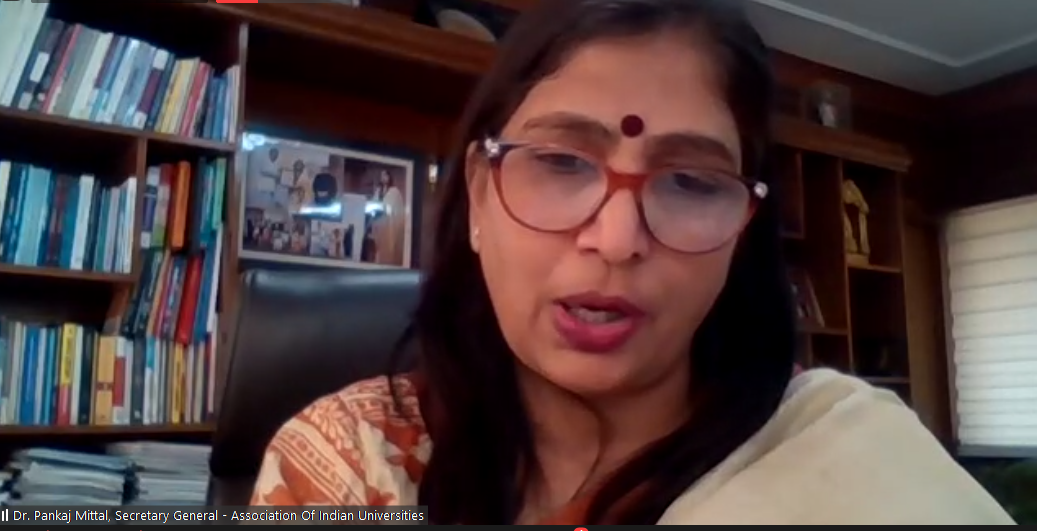IB schools should align their policies with NEP: Pankaj Mittal, Secretary-General of AIU
There has been much discussion among educators to ensure that all students gain the necessary 21st-century skills, including the development of curiosity and creativity during their schooling. IB curriculum has incorporated these two key skills in their educational setting.
ASMA, a few days back, conducted the School Education Leadership Forum which was attended by the educators and industry leaders to discuss the IB school curriculums. Pankaj Mittal, the Secretary-General of AIU (Association of Universities) was one of the panelists, who brought out a few crucial points in regards to this.
She begins her discussion by talking about the national education policy in regards to higher education and what type of recognition has been provided by AIU for the IB programs.
The students who come after the IBDP program in India won’t get that exposure because there are several courses that are not available. She believes that all the International boards must align with the national education policy and the National curriculum framework.
So right now whatever National curriculum framework is providing IB is complying with them but in the future also if there are any changes IB schools will be expected to comply with those provisions, related to NEP.
Now when we go to school education, we can see a lot of changes have been made. For example, we had higher education, 10 + 2 but now we have shifted to 3 + 4 + 5 classes. This means that elementary child care is also now included in formal schooling.
Although IB schools are trying to cope up with the national education policy but IB has to see very very careful that whatever has been indicated; is being followed. For example, in the foundation stage, the policy says that it would be off initial 5 years where the first three years would be playschools, where children would be learning by playing. So IB will be merging these three years of school education with formal education.
This is part of the new education policy. First, there would be a preparatory stage which will be included till 5th class, then there would be middle stage which will be 6 to 8, and then there would be the secondary stage that would be from class 9 to 12.
The NEP says that the students are free to choose their subjects at the higher secondary stage which is also applicable in the case of IB schools. IB schools would also take special care regarding a holistic education of the children. In holistic education, the focus is not only on academics but also the vocational education that would help in the character-building process. All the good values get inculcated within the students after they leave the schools. This is what makes the IB school education unique. It focuses on value education.
In the future, NEP will also give accreditations to schools, unlike colleges. If this happens in the case of every Indian school then IB schools might also have the chance of getting accredited by NEP. So this can also come up in the future which all the IB schools should take care of.
NEP also came up with new policies, one of which is the provision of mid-day meals, which are not of course provided in IB schools. But they should at least ensure that they are offering fresh food in canteens. Apart from that, NEP is also currently focusing on experiential learning in higher education especially, which means that the students should learn from their own life experiences. This includes not only practical classes but hands-on training and storytelling programs. This will help in the arousal of curiosity within the students. Also, NEP has focused on the area that the assessment framework should align with the learning outcome.
Also, the policy says that the till 5th standard, students should be taught in their mother tongue. But in the country like India, this might not be possible as per Pankaj; because India is a multilingual country and IB schools are strictly English medium schools. For IB schools, country-oriented subjects can be focussed upon.
In this entire discussion in School Education Leadership Forum, she also talks on the approvals that were given by AIU to IB programs. This includes:
- Comparison with the 10th standard known as the IBMYP
- Approval given to IBDP
- Equivalence in CP or career program
As per a recent survey, it has also been found that only 5% of vocational education is being taught in Indian schools. The policy says that at least 50% of students should get trained with skill-based school education in the next few years.
Pankaj at last ends her discussion in School Education Leadership Forum webinar saying that IB schools should align their policies with the national education policies. If they are missing out on something then they must keep a check of it and try implementing it for the betterment of the students. This is essential because the students who are studying in IB schools in India know about their culture, their languages, about the Indian value system and knowledge system.




